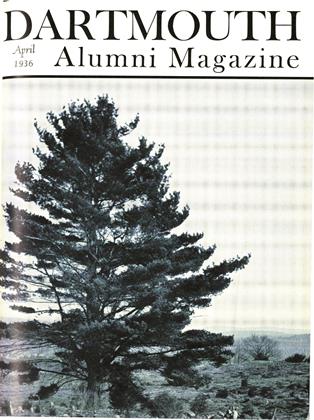THERE IS SOMETHING incredibly magnificent about the free delivery of the feature Carnival Issue of The Dartmouth to the door of every alumnus of the College. The gesture transcends the wildest imaginings of the not so long ago. In our day no advertiser lived who would have invested such a stake for so noble a purpose; no editorial staff, for that matter, could have produced such a paper. Mae West, Carole Lombard, Burns and Allen, send prepaid telegrams of congratulation to the undergraduate revelers of today, whereas our acquaintance with movie stars was limited to their mute gesticulations on the flickering screen of the Nugget.
There is satisfaction, nevertheless, in recalling an occasion when a presentable issue of the then thrice-weekly Dartmouth was scrambled up on a moment's notice. Hardly had the whole tooting apparatus of Hanover blared forth the word of the Armistice before the skeleton staff of the paper jumped into action. There was no Associated Press service, no horde of willing heelers, no directing genius,—nothing but a handful of miscellaneous editors, ready for a busman's holiday in Frank Musgrove's print shop. This motley lot- no more than half a dozen at most—wrote the whole sheet, adds and all. Slumbering journalistic talent was released for a day from the shackles of the S. A. T. C. If insufficient news could be filched from the few available sources, it is conceivable that the gaps were filled in by sheer inventive enterprise. Anyhow, the College learned through its own house organ how the war had come to an end, even though the proud companies of Dartmouth's military detachment performed squads right on the campus for another month or more. The Dartmouth of that era was developing personality. Tom Groves was the paper's F. P. A., mixing up current chit- chat with searing irony and polished trifles.
of verse. Dan Ruggles tossed off Sportraits by the yard. Cliff Meredith had been the most ingenious of business managers (there was a man who could turn a Commencment into a commercial success); but Ray McPartlin was the boy who showed all managing editors how to manage. His unquenchable energy produced the DailyDartmouth and secured the A. P. franchise —a thing of horror for the unfortunate who took down the staccato messages as they came over the telephone at midnight.
New insignia were devised to tickle the fancy of the freshmen and swell the ranks of the heelers. "Proof and Copy," with its appropriate badge, rose to vie with "Rake and Roll" and the non-athletic "Foot- lights." Then Pi Delta Epsilon, journalistic fraternity, installed a chapter in Hanover, and there was another kind of key to be had for the seeking. Jewelry salesmen must have been abroad in the land, for the craze for new gold gimcracks spread faster year by year. The thing reached its peak finally when the Dartmouth Christian Association distributed medals of honor to be draped on the vests of the largest Cabinet in its history.
Who was the most versatile and hence the most gaudily bedecked undergraduate of the time? Bill Cunningham somehow comes to mind, although Sherry Baketel and Art Stockdale must have been in the running. It may be, too, that the gold rush did not hit its high until a year or two later, in which case Jack Hubbell and Orton Havergal Hicks would have ranked among the more successful prospectors. All these details fit into some kind of pattern. It was an age of naivete and unsophistication, of enthusiasm spurred by ambition, of giving one's all for the glory of extra-curricular activity. It might have been a good deal worse, when you come to think about it.
 View Full Issue
View Full Issue
More From This Issue
-
 Article
ArticleGovernment Service for College Men
April 1936 By Robert T. Keeler '36 -
 Class Notes
Class NotesClass of 1911
April 1936 By Prof.Nathaniel G.Burleigh -
 Article
ArticleGRADUS AD PARMASSUM
April 1936 -
 Class Notes
Class NotesClass of 1910
April 1936 By Harold P. Hinman -
 Article
ArticleHANOVER BROWSING
April 1936 By Herbert F. West '22 -
 Class Notes
Class NotesClass of 1920
April 1936 By Frank B. Morey
R.M.Pearson '20
Article
-
 Article
ArticlePRESIDENT NICHOLS GUEST OF BRITISH ASSOCIATION
August, 1914 -
 Article
ArticleSECRETARIES' MEETING, APR. 25, 26
February, 1924 -
 Article
Article78 Sons of Dartmouth Alumni Included in Present Freshman Class
November 1936 -
 Article
ArticleMasthead
February 1956 -
 Article
ArticleMasthead
DECEMBER • 1985 -
 Article
ArticleNovember Schedule
November 1956 By CLIFF JORDAN '45


